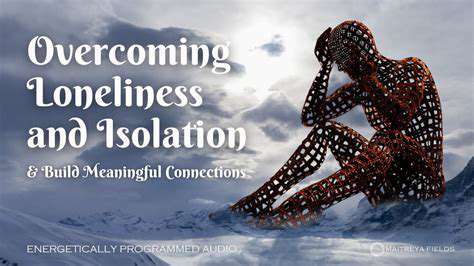The Profound Effects of Loneliness on Mental and Physical Health
The Psychological Toll of Loneliness
The Emotional Impact of Loneliness
Loneliness can lead to a range of emotional challenges, including feelings of sadness, anxiety, and hopelessness. Individuals who experience prolonged loneliness often report a diminished sense of well-being and increased levels of depression.
Such emotional distress can create a negative feedback loop; as individuals feel more lonely, they may withdraw further from social interactions, exacerbating their emotional state. This pattern can be particularly harmful and difficult to break.
Moreover, the stigma associated with loneliness can prevent individuals from seeking help, causing them to hide their feelings instead of reaching out for support. This can further deepen their sense of isolation and helplessness.
The Link Between Loneliness and Physical Health
Recent studies have shown a clear link between loneliness and various physical health issues. Individuals who feel lonely are at higher risk for conditions such as heart disease, high blood pressure, and even weakened immune systems.
Research indicates that loneliness can trigger inflammatory responses in the body, which may contribute to the development of chronic illnesses. This biological response can lead to a cycle where poor physical health further engenders feelings of loneliness, creating a vicious cycle.
Furthermore, loneliness has been linked to unhealthy lifestyle choices, such as poor diet and lack of exercise. When individuals feel isolated, they may be less likely to engage in health-promoting behaviors, which can have serious long-term consequences for their well-being.
The Physical Health Risks Linked to Loneliness
The Impact of Loneliness on Cardiovascular Health
Loneliness has been linked to an increased risk of cardiovascular diseases. Studies suggest that individuals who experience prolonged periods of isolation can develop higher blood pressure and elevated levels of stress hormones, which can place a strain on the heart.
Moreover, lonely individuals may be less likely to engage in physical activity or maintain a healthy lifestyle. This sedentary behavior can contribute to obesity, a significant risk factor for heart disease, further exacerbating health issues.
Research indicates that loneliness can lead to unhealthy coping mechanisms, such as overeating or substance abuse, both of which may adversely affect cardiovascular health. Understanding this connection can aid in developing effective interventions for those at risk.
Healthcare professionals should be aware of the relationship between loneliness and heart health, as addressing social isolation may prove beneficial in not only improving emotional wellbeing but also enhancing physical health outcomes.
How Loneliness Affects Immune Function
Scientific studies have revealed that loneliness can weaken the immune system, making individuals more susceptible to infections and illnesses. Chronic loneliness can elevate inflammatory markers in the body, leading to an increased risk of autoimmune diseases.
The psychological stress associated with loneliness triggers the production of stress hormones, like cortisol, which can interfere with immune response. A compromised immune system is less able to fight off pathogens, leaving lonely individuals vulnerable to various health issues.
Furthermore, loneliness can hinder one's likelihood of seeking medical care, resulting in untreated conditions that may become more severe. This delay in seeking treatment can have dire consequences on overall health and wellbeing.
Promoting social connections and engagement in community activities may help mitigate these effects, fostering better immune health and encouraging individuals to prioritize their physical wellbeing.
The Long-Term Consequences of Loneliness on Health
Loneliness is not just a temporary emotional state; its long-term effects can lead to chronic health issues. Prolonged loneliness can result in a decline in cognitive health, increasing the risk of dementia and other neurodegenerative diseases.
Additionally, persistent feelings of loneliness can lead to mental health disorders such as depression and anxiety, which can have further implications for physical health. The stigma surrounding mental health issues may prevent individuals from seeking help, perpetuating the cycle of loneliness and poor health.
Long-term loneliness can also manifest in unhealthy lifestyle choices, including poor nutrition and lack of exercise, which contribute to an array of chronic health conditions. This interplay highlights the importance of addressing loneliness as a critical factor in public health initiatives.
Community programs centered around social support and mental health resources can help reduce loneliness, ultimately improving both mental and physical health outcomes for individuals at risk.
Overcoming Loneliness and Building Connections

Understanding the Causes of Loneliness
Loneliness can stem from various factors, including social isolation, major life changes, and personal perceptions. Recognizing the root causes of loneliness is vital for addressing it effectively. Many individuals experience loneliness during significant transitions, such as moving to a new city or going through a divorce. Additionally, the rise of digital communication can ironically contribute to feelings of isolation, as online interactions often lack the depth of face-to-face relationships.
Age can also play a crucial role in loneliness, with older adults frequently facing isolation due to physical limitations or the loss of friends and family. The perception of being alone can lead to a cycle where individuals withdraw even further, intensifying their feelings of loneliness. Understanding these dynamics can empower individuals to take proactive steps toward social engagement.
Another important aspect is cultural factors, as some societies promote individualism, which can elevate the risk of loneliness. Social expectations can inhibit someone’s willingness to reach out for support or forge new connections. It's important to foster environments that encourage people to share their feelings and seek companionship.
Lastly, mental health challenges, such as anxiety and depression, can exacerbate the experience of loneliness. These conditions not only make it difficult to maintain social connections but can also skew one’s perception of their relationships. Recognizing the links between mental health and loneliness can lead to better support systems and interventions.
The Psychological Impact of Loneliness
Loneliness has profound effects on an individual’s psychological well-being. Studies have shown that persistent loneliness can lead to increased symptoms of anxiety and depression. These mental health issues can create a vicious cycle where loneliness feeds into further isolation, resulting in a decline in overall well-being.
Moreover, loneliness can skew one's self-perception, leading to issues of self-esteem and self-worth. Individuals might see themselves as unworthy of connections, driving them further into isolation. As a result, they may stop seeking out social interactions entirely, reinforcing their feelings of being unloved or undesired.
Cognitive function can also be negatively affected by loneliness, with individuals experiencing memory problems and decreased focus. This mental decline further reduces a person's ability to engage socially. They may find it increasingly challenging to respond to social cues, making interactions more daunting.
To combat the psychological impacts of loneliness, therapeutic interventions can be effective. Methods such as Cognitive Behavioral Therapy (CBT) can help individuals reshape their thoughts about social interactions and build healthier self-perceptions. Support groups and community initiatives can also provide an opportunity for individuals to connect and share their experiences.
Strategies for Overcoming Loneliness
There are several strategies individuals can employ to overcome feelings of loneliness. First and foremost, reaching out to friends and family can greatly alleviate feelings of isolation. Setting scheduled times for social interaction, whether in-person or virtually, can create a sense of routine and belonging.
Engaging in community activities is another effective method to foster connections. Joining clubs, volunteering, or attending local events can introduce individuals to like-minded people, creating new friendships. These activities not only provide social interaction but also enable individuals to feel valued and useful in their communities.
Practicing self-compassion and building self-awareness are essential steps as well. Individuals should acknowledge their feelings of loneliness without stigma and recognize that it's a common human experience. Journaling or engaging in mindfulness practices can help individuals process their emotions and develop a deeper understanding of their needs.
Lastly, seeking professional help when loneliness becomes overwhelming is crucial. Therapists and counselors can provide tools and support for individuals struggling with isolation, helping them develop coping strategies and ways to connect with others. Taking action in seeking help is a significant step towards overcoming loneliness.
A Call to Awareness

The Psychological Impact of Loneliness
Loneliness can lead to a myriad of psychological issues, including anxiety, depression, and low self-esteem. Research has shown that individuals who experience chronic loneliness are at a higher risk for developing mental health disorders. This persistent feeling of isolation can distort one's self-image and lead to negative thought patterns.
Many people may not recognize the early signs of loneliness, which can manifest as feelings of sadness or an overwhelming sense of disconnection from others. It's essential to acknowledge these feelings and understand their potential consequences on mental health.
The stigma surrounding loneliness often prevents individuals from seeking help, making it crucial to promote open conversations about mental wellness. Awareness and education can empower individuals to reach out for support and connect with others.
Therapeutic interventions, such as group therapy or counseling, can significantly help those struggling with feelings of loneliness. These approaches can provide valuable tools for building social connections and enhancing emotional resilience.
The Physical Effects of Loneliness
While loneliness is primarily seen as a mental challenge, its physical repercussions can be quite severe. Studies have indicated that prolonged loneliness can lead to various health issues, such as high blood pressure, heart disease, and decreased immune function. By affecting our physical health, loneliness poses risks that extend beyond just emotional well-being.
For instance, lonely individuals are more likely to engage in unhealthy behaviors, such as poor nutrition, lack of exercise, and substance abuse. The lack of social support can also hinder one's ability to sustain a healthy lifestyle, further compounding health risks.
Moreover, the stress associated with loneliness can trigger inflammatory responses in the body, which are linked to numerous chronic illnesses. This cycle underscores the need for holistic approaches to health that consider both mental and physical dimensions.
Encouraging social interactions, whether through community events or online platforms, can help mitigate these adverse health effects. By fostering a sense of belonging, we can improve both our mental and physical health.
Strategies to Combat Loneliness
Combatting loneliness requires proactive measures that encourage social engagement and emotional connection. One effective strategy is to actively seek out social activities, whether through clubs, classes, or volunteer work, which can provide opportunities to meet new people.
Additionally, nurturing existing relationships is crucial. Setting aside regular time to connect with friends and family, even virtually, can solidify bonds and diminish feelings of loneliness. Prioritizing relationships ensures that individuals do not feel isolated.
Mindfulness practices, such as meditation or journaling, can enhance self-awareness and reduce the impact of negative thoughts associated with loneliness. By fostering a greater understanding of their own feelings, individuals can more effectively address their emotional needs.
Lastly, leveraging technology can create avenues for connection, especially for those with mobility concerns. Online platforms can facilitate friendships and support networks, ensuring that no one has to navigate their feelings of loneliness alone. It is vital to recognize the value of community, both in-person and online.